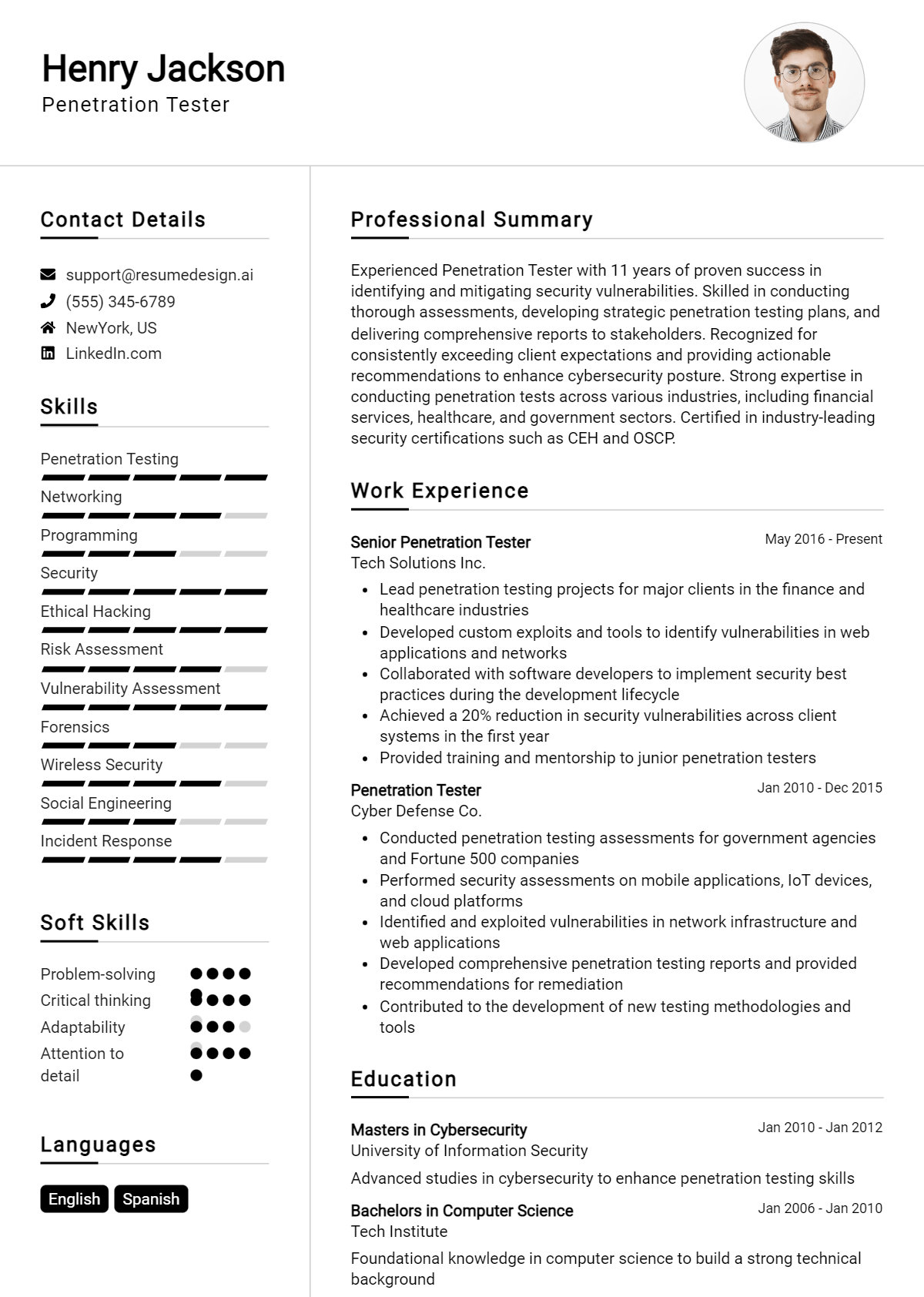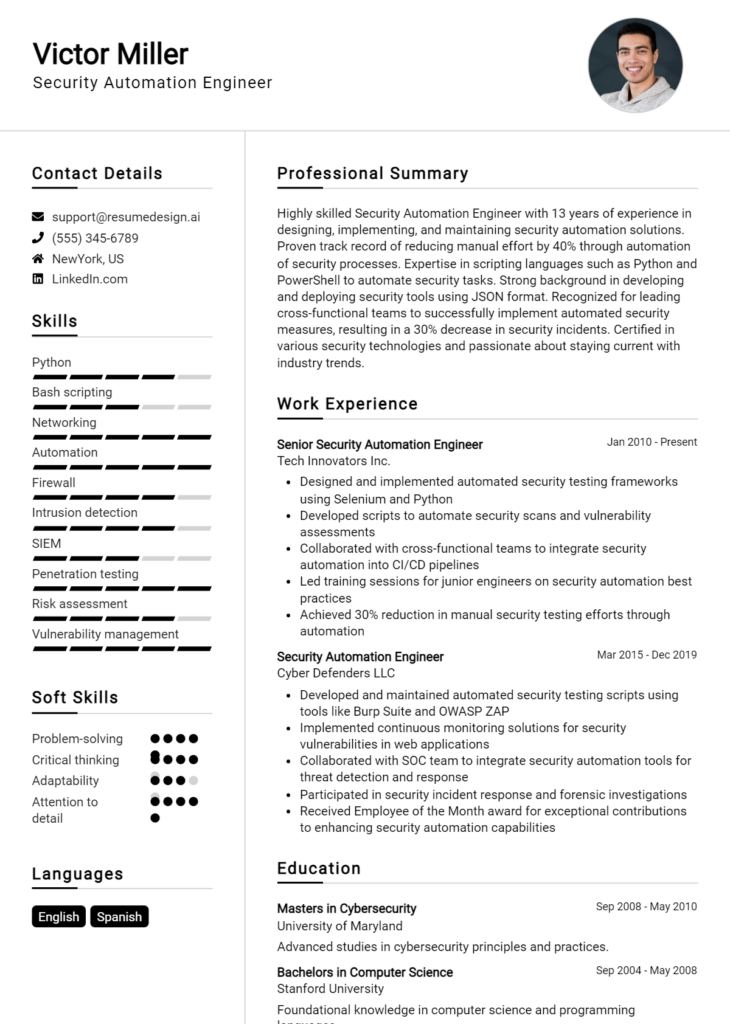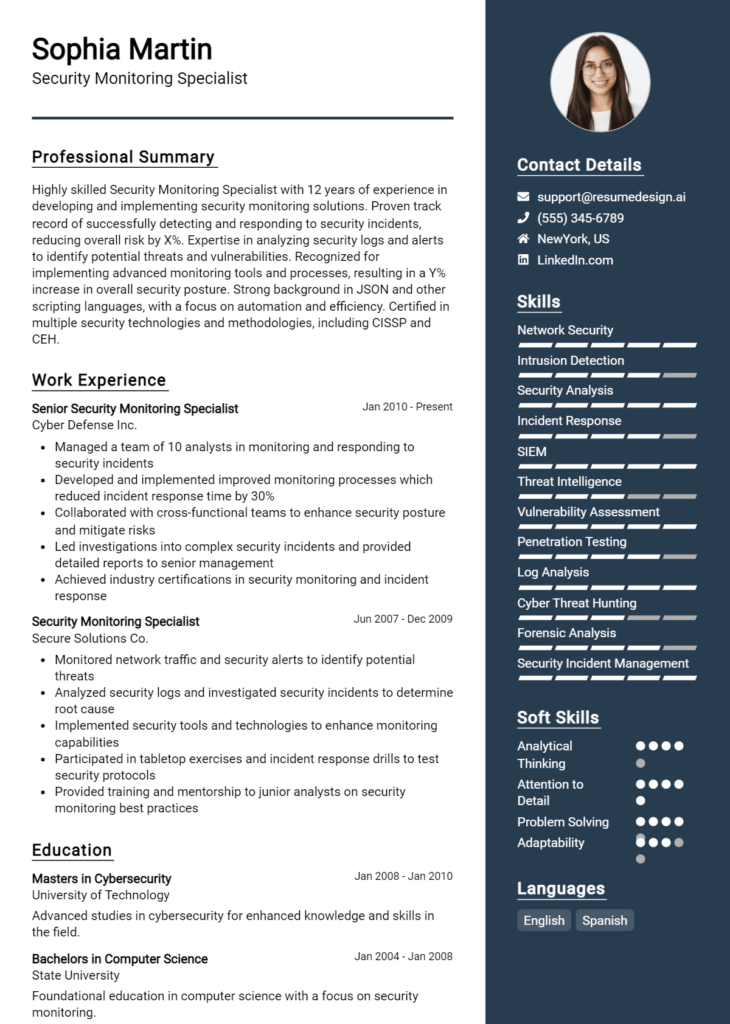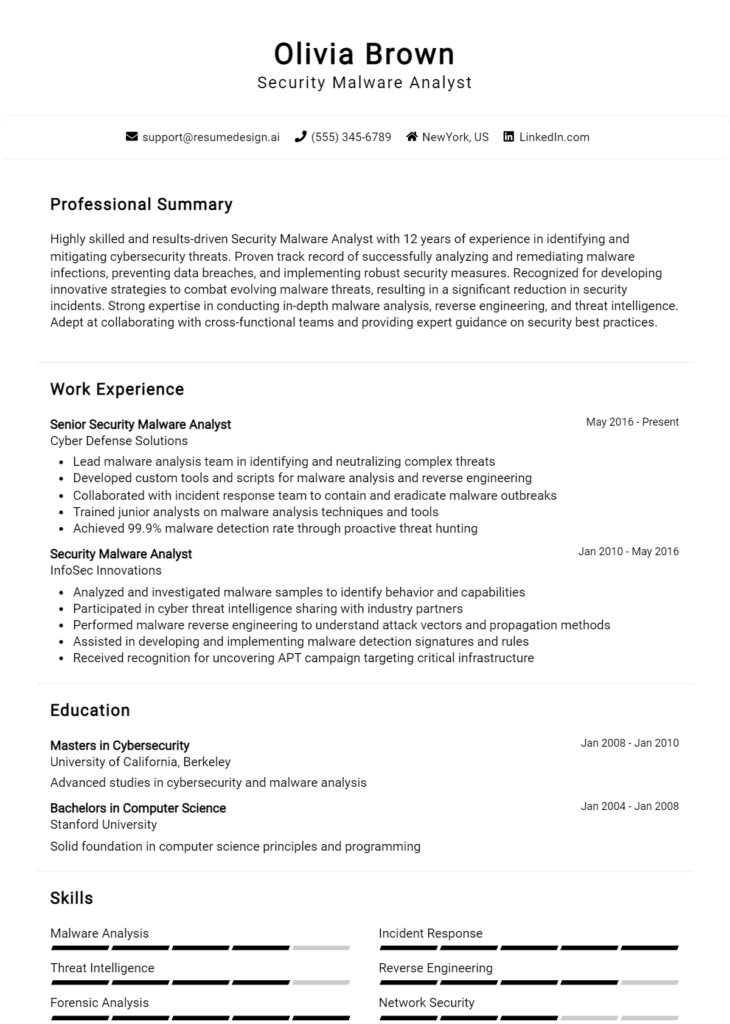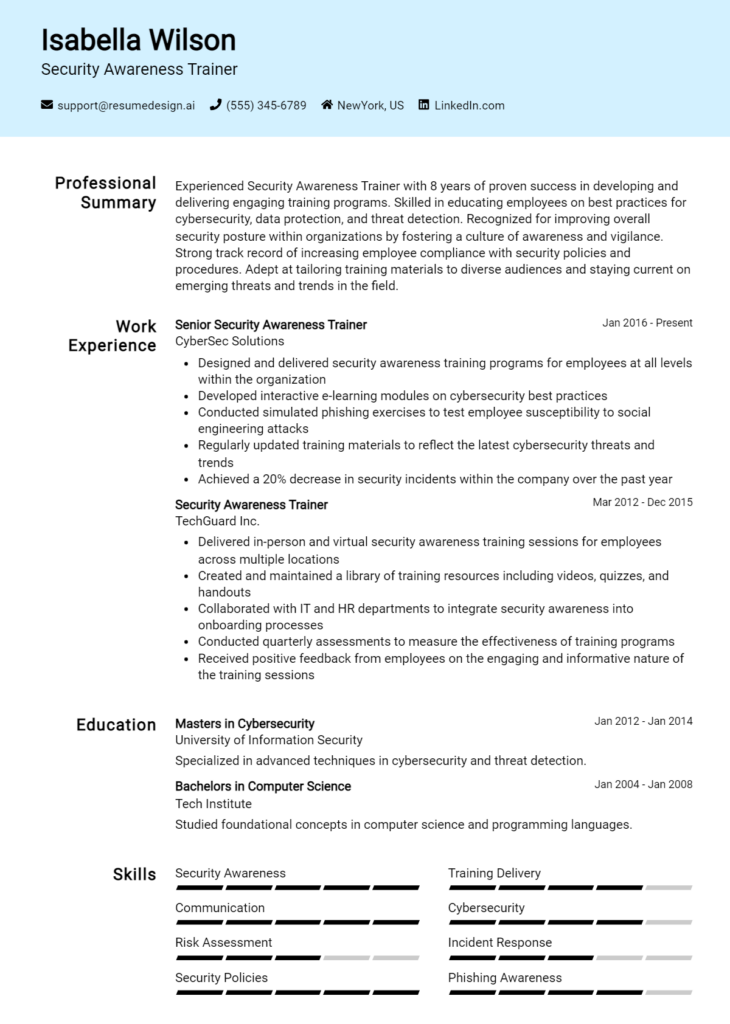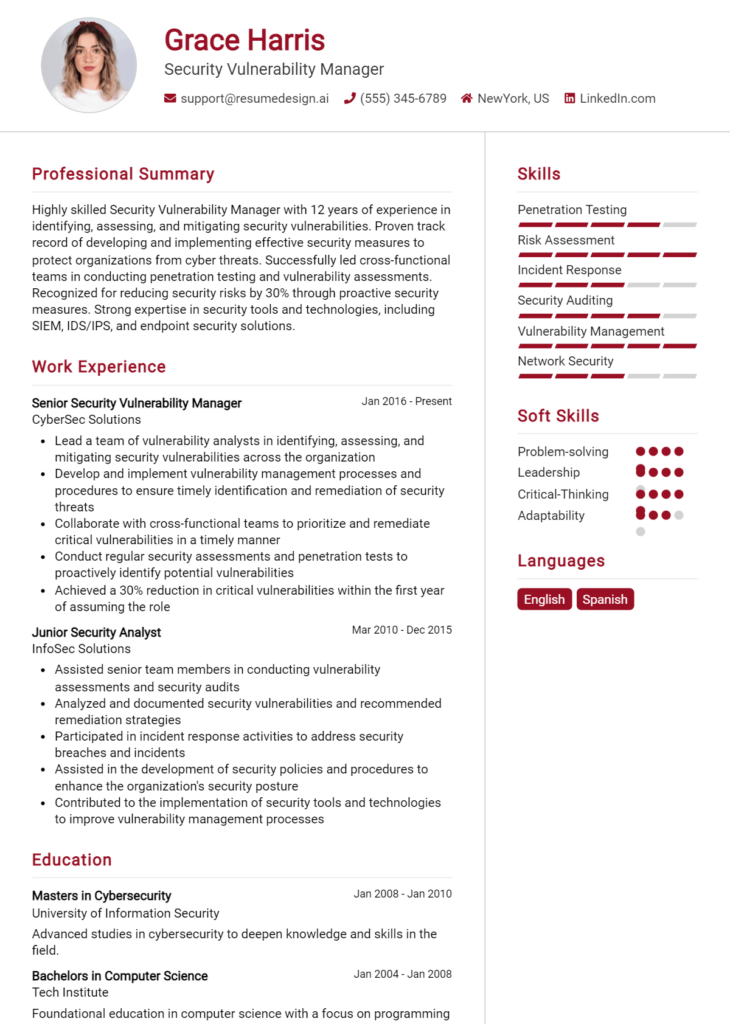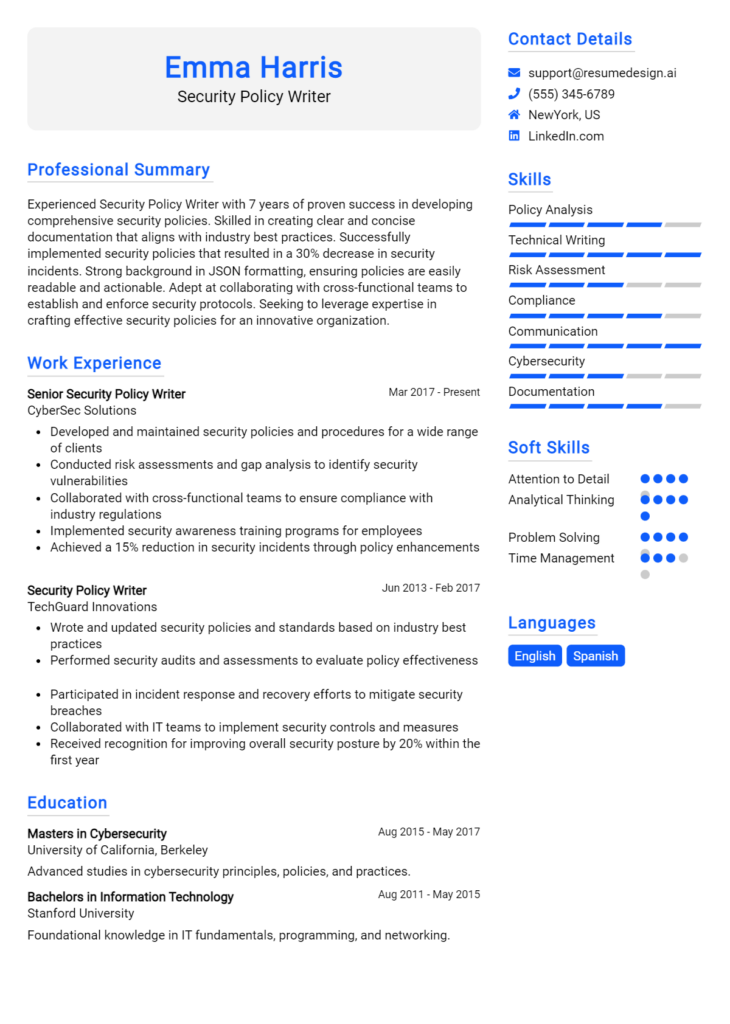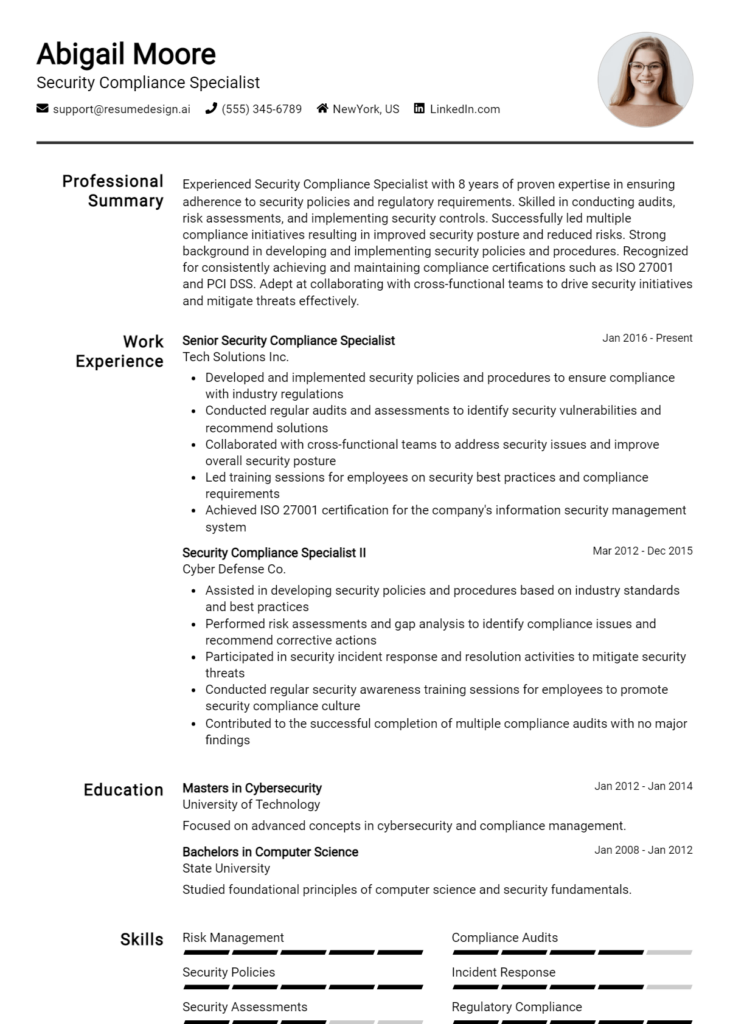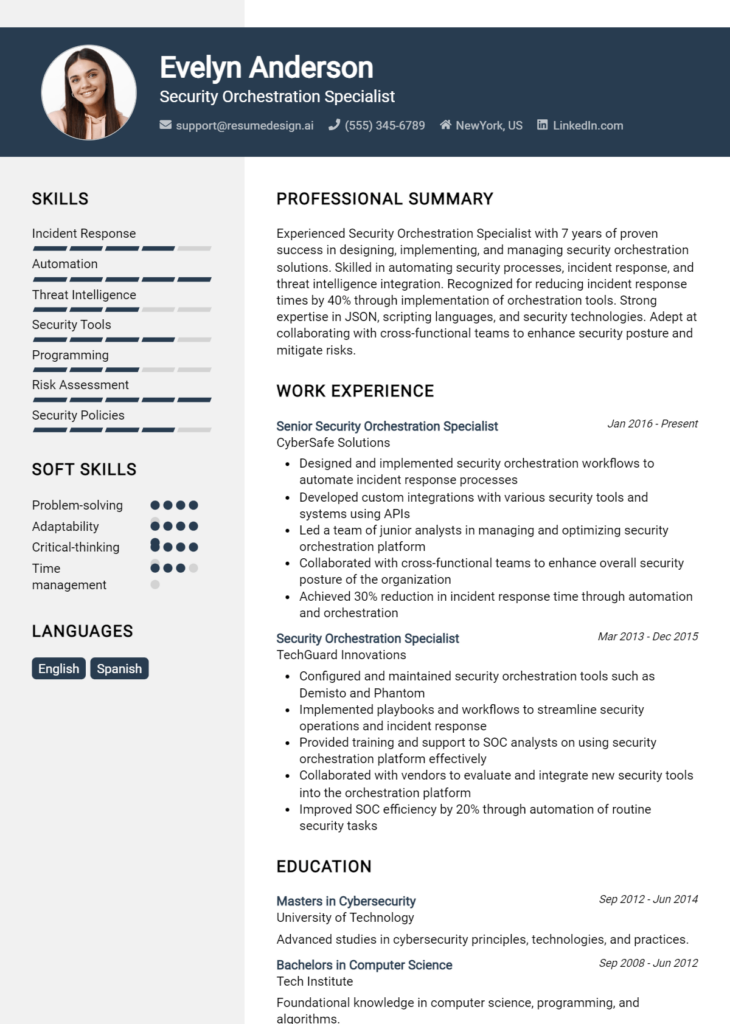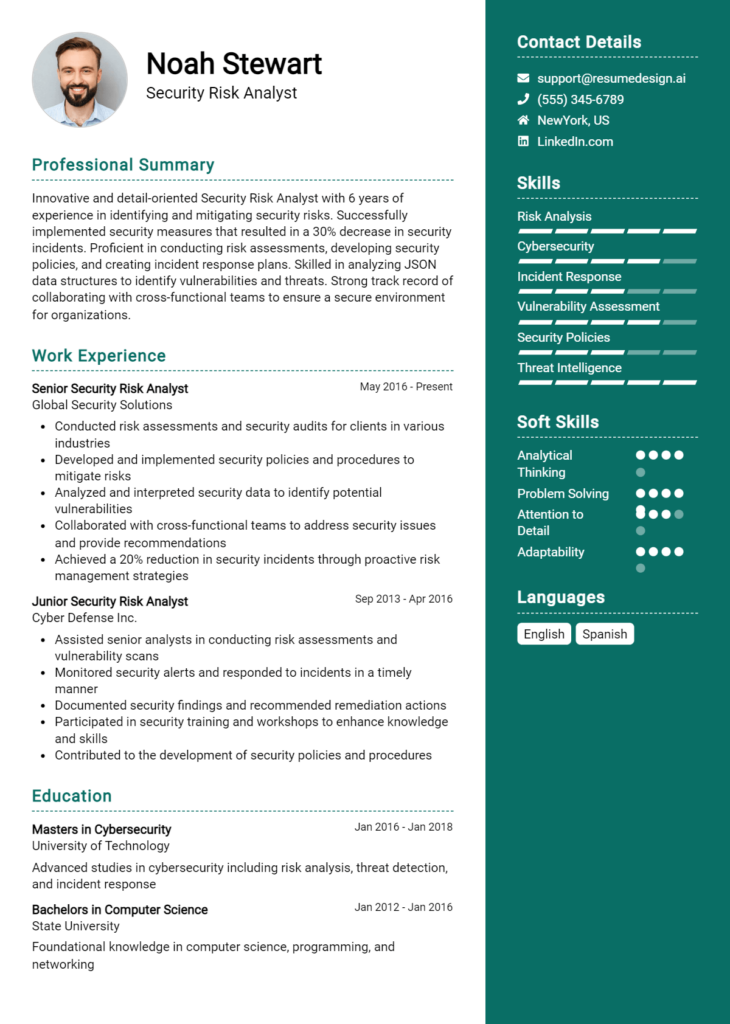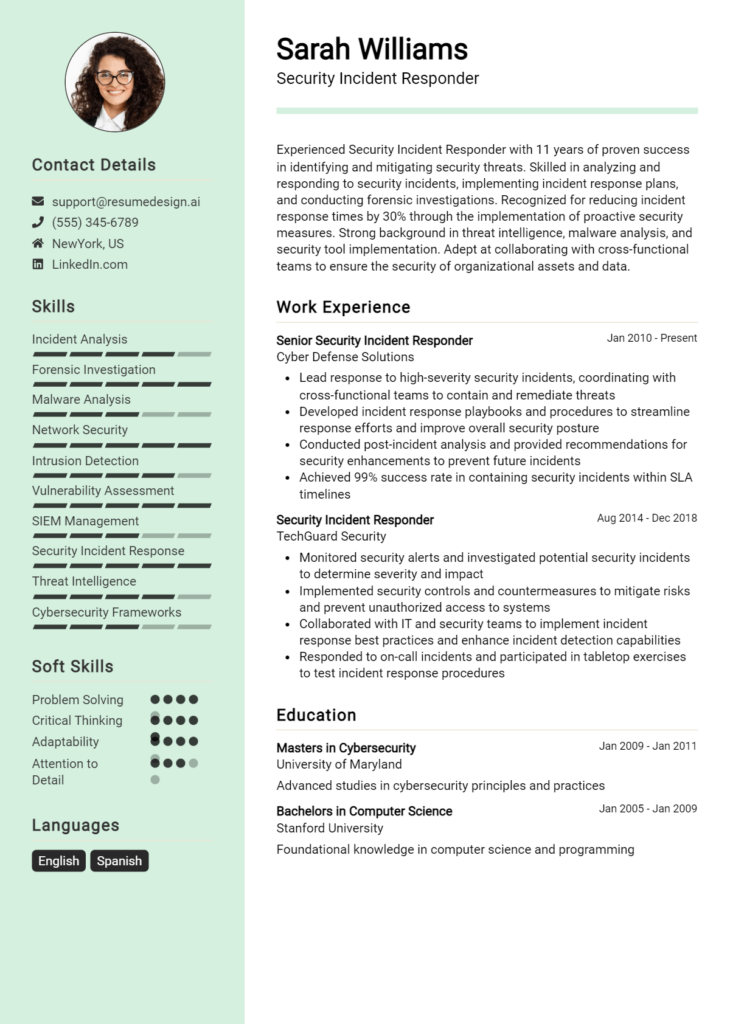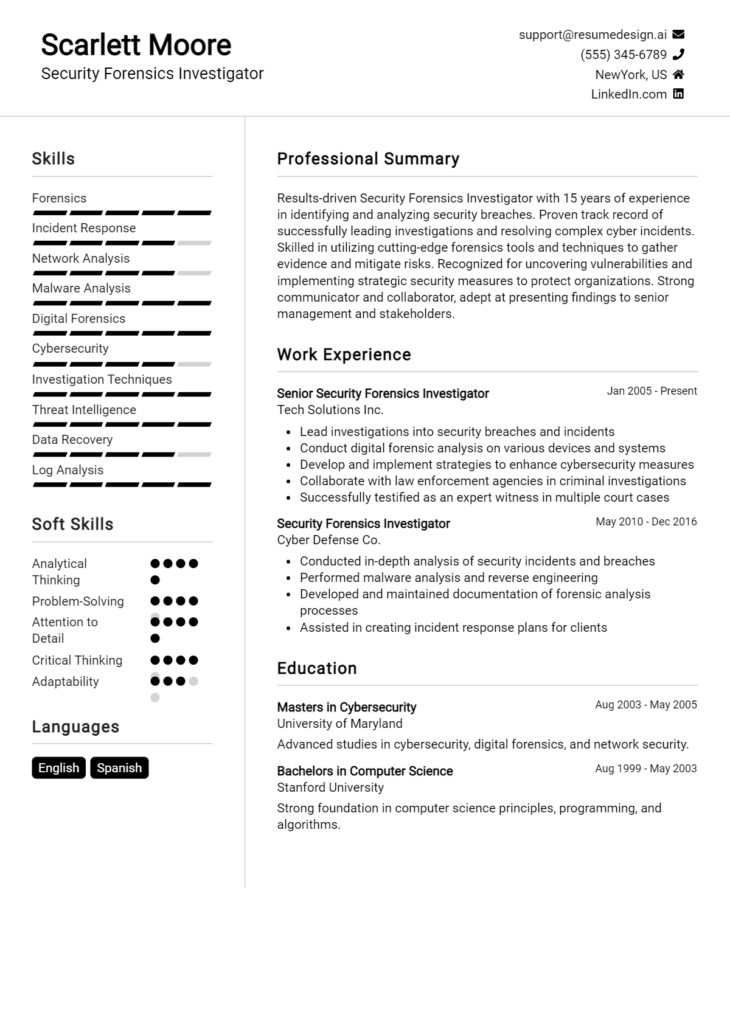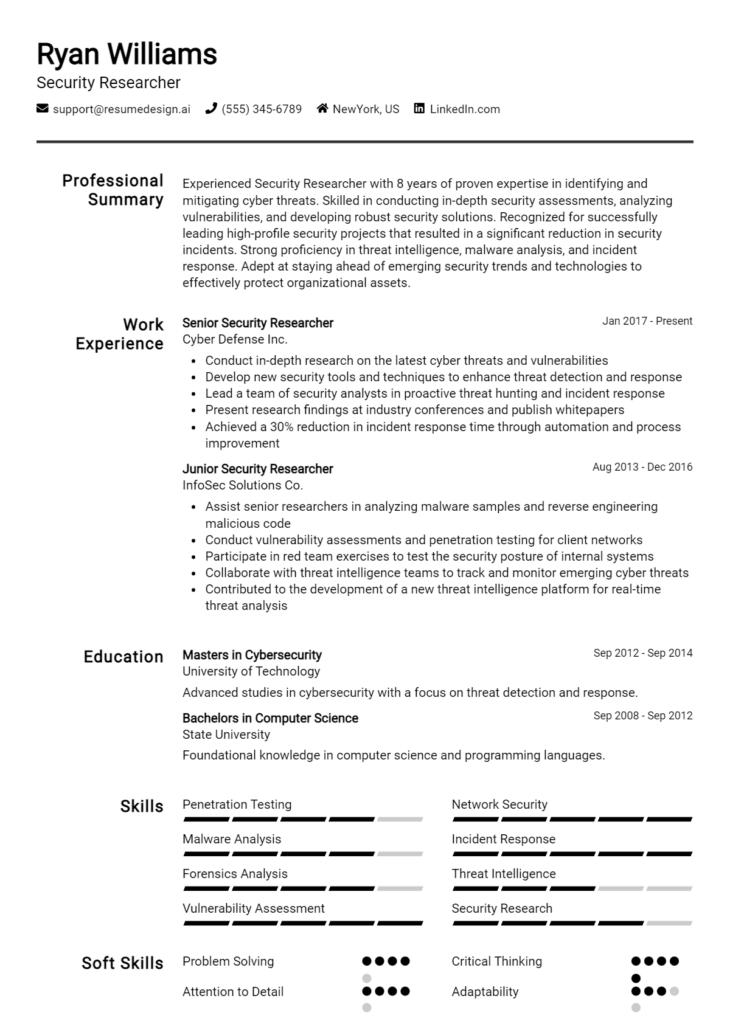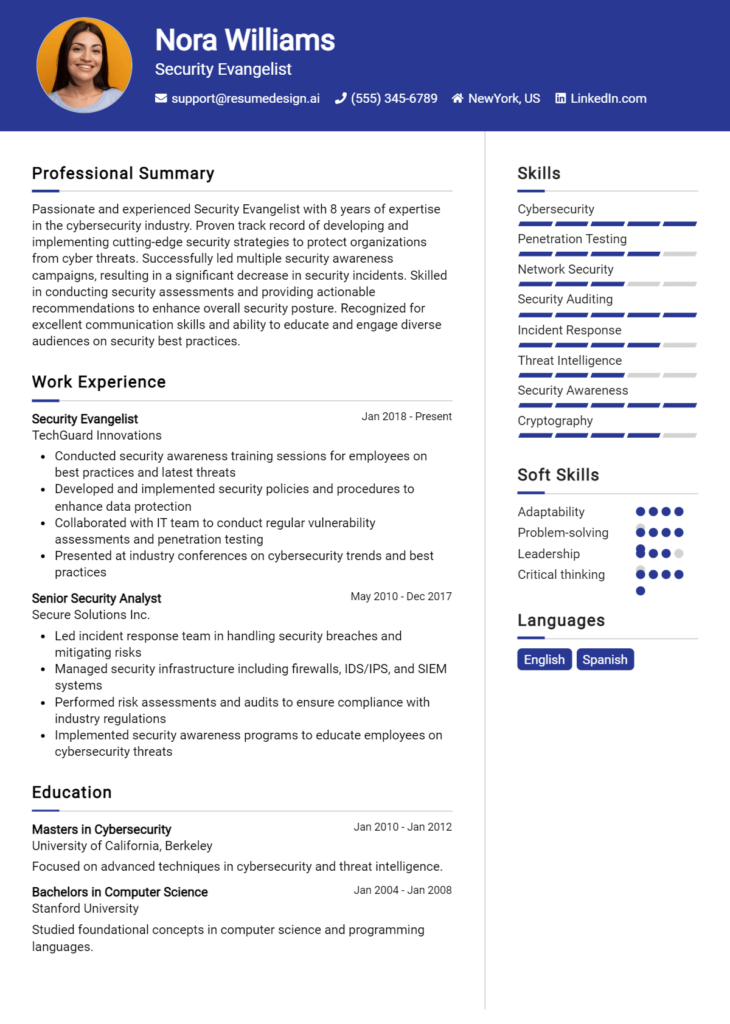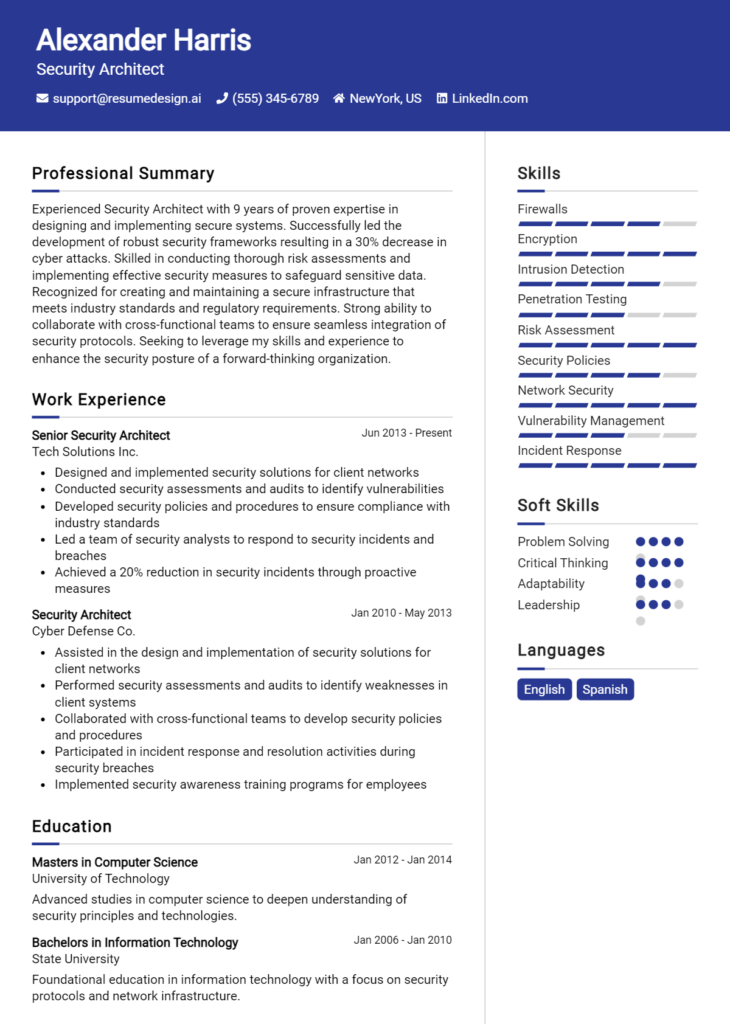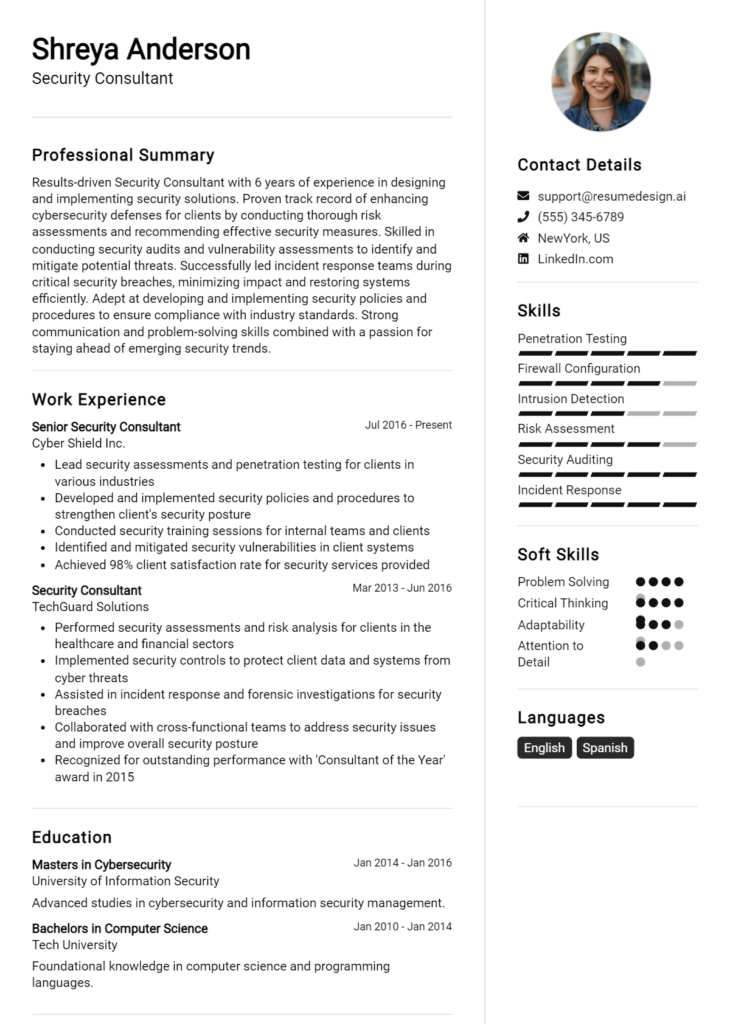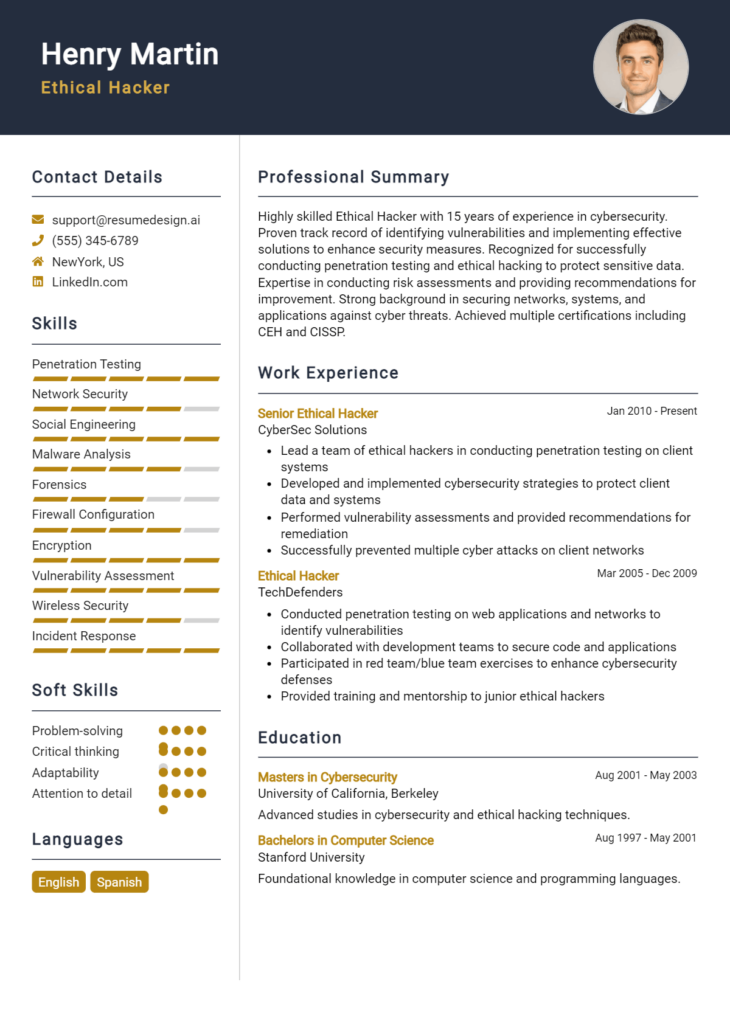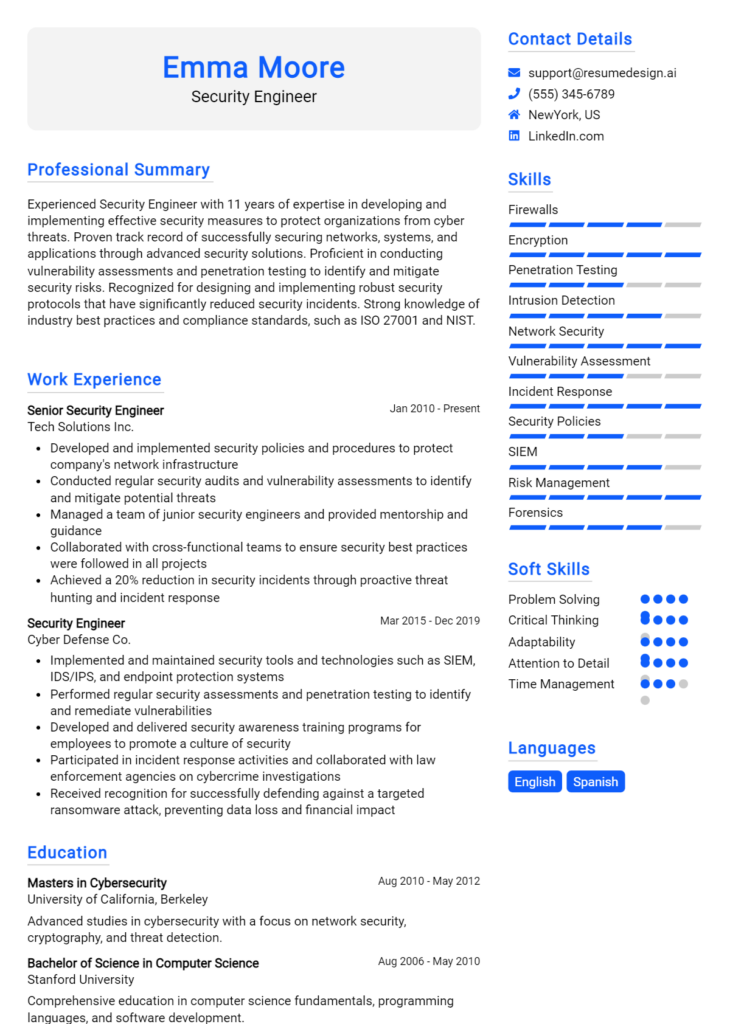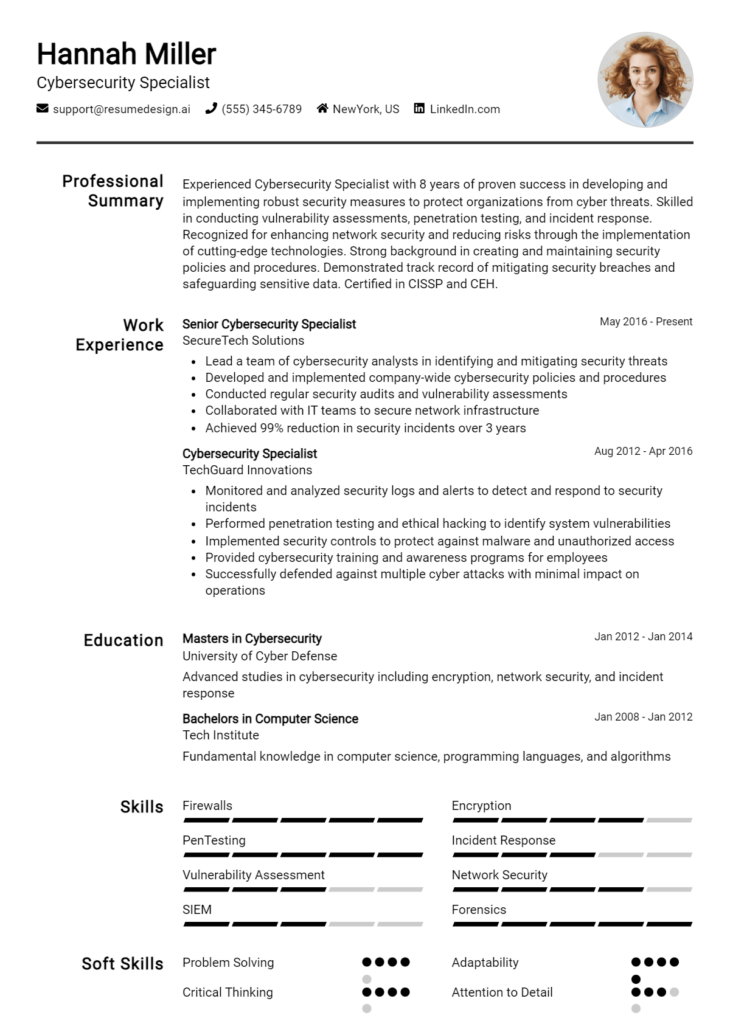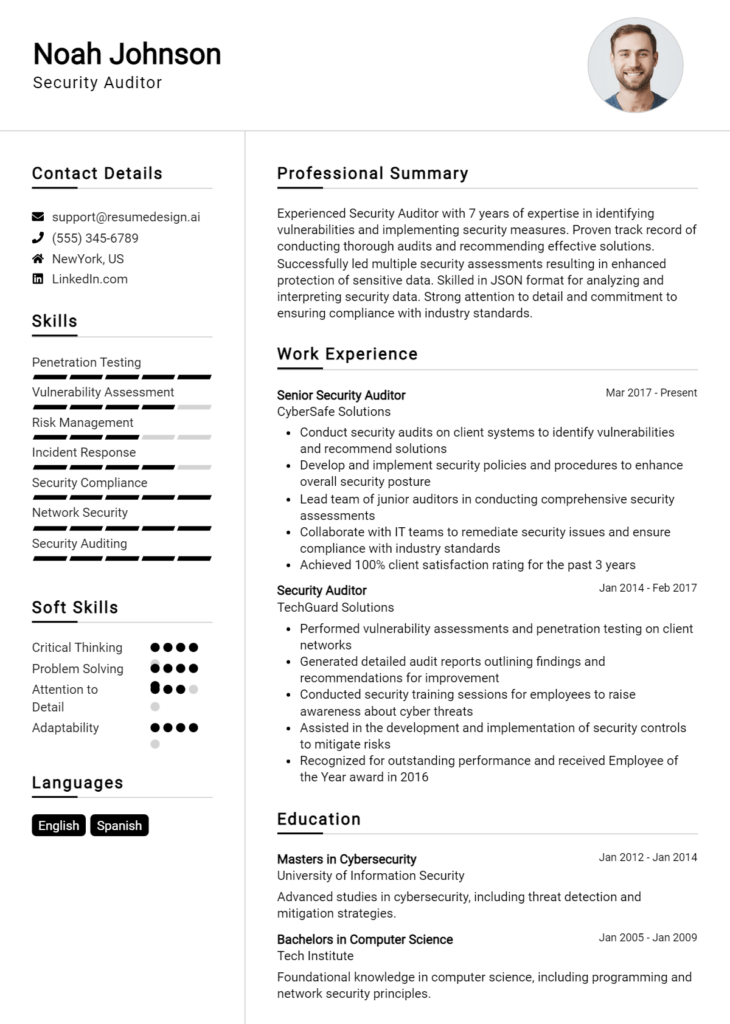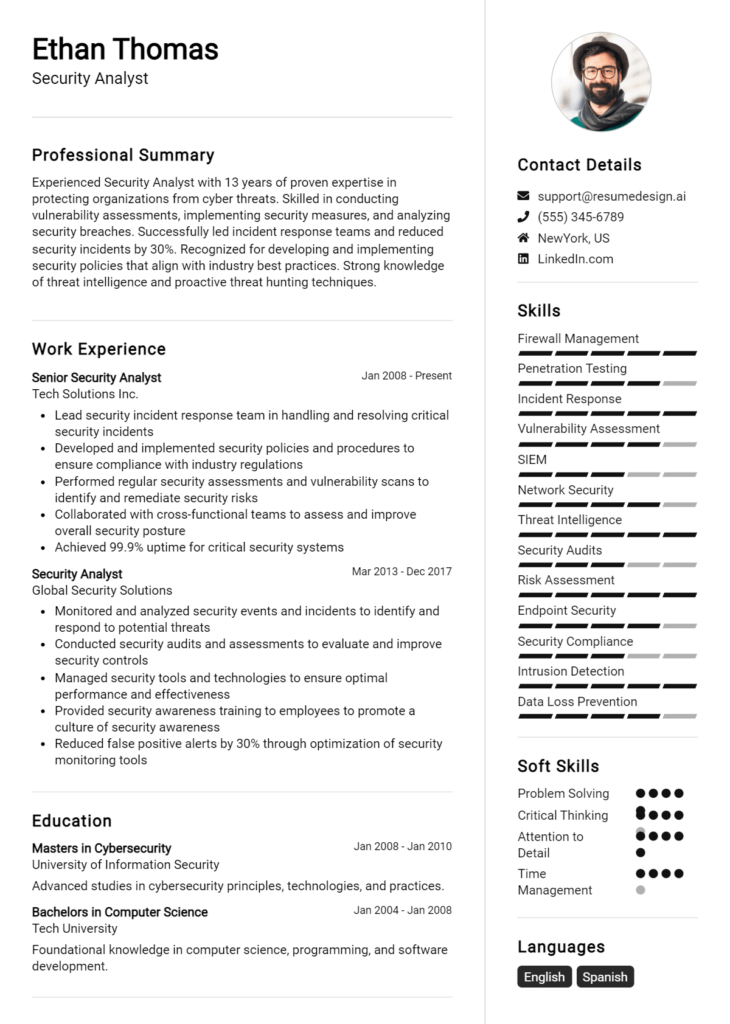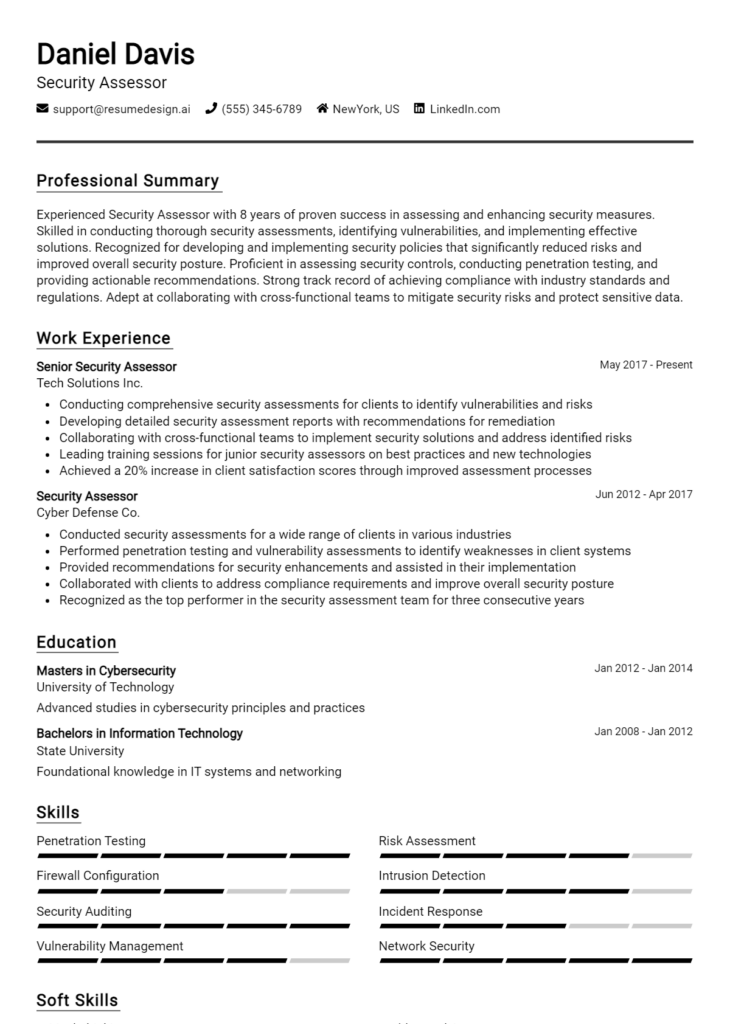Penetration Tester Core Responsibilities
A Penetration Tester is essential in safeguarding an organization’s digital assets by identifying vulnerabilities within systems and networks. This role requires a blend of technical skills, operational knowledge, and strong problem-solving abilities to effectively simulate cyber-attacks and assess security measures. By collaborating with IT, security, and compliance teams, Penetration Testers help bridge various departments, enhancing the organization’s overall security posture. A well-structured resume highlighting these competencies is crucial for showcasing one's qualifications and aligning with organizational goals.
Common Responsibilities Listed on Penetration Tester Resume
- Conducting security assessments and penetration tests on applications, networks, and systems.
- Identifying vulnerabilities and providing detailed reports with remediation strategies.
- Collaborating with development and operations teams to enhance security protocols.
- Performing social engineering tests to evaluate employee awareness.
- Utilizing various tools and techniques for penetration testing.
- Staying updated on the latest security threats and vulnerabilities.
- Conducting risk assessments and evaluating security controls.
- Preparing and presenting findings to stakeholders and management.
- Developing and maintaining security testing methodologies and documentation.
- Participating in incident response and forensic investigations.
- Training staff on security best practices and awareness.
High-Level Resume Tips for Penetration Tester Professionals
In the competitive field of cybersecurity, a well-crafted resume holds paramount importance for Penetration Tester professionals. This document often serves as the first impression a candidate makes on a potential employer, making it essential to reflect both technical skills and noteworthy achievements effectively. A strong resume not only showcases your ability to identify and mitigate security vulnerabilities but also communicates your passion for the field and your commitment to continuous improvement. In this guide, we will provide practical and actionable resume tips tailored specifically for Penetration Tester professionals, helping you stand out in a crowded job market.
Top Resume Tips for Penetration Tester Professionals
- Tailor your resume to align with the specific job description, highlighting the skills and experiences that match the employer's needs.
- Showcase relevant experience, including internships, projects, and previous roles, to demonstrate your practical knowledge in penetration testing.
- Quantify your achievements; for example, mention the percentage of vulnerabilities you successfully identified or the time saved by implementing security measures.
- Highlight industry-specific skills such as knowledge of penetration testing tools (e.g., Metasploit, Burp Suite) and methodologies (e.g., OWASP, NIST).
- Include certifications relevant to the field, such as Certified Ethical Hacker (CEH) or Offensive Security Certified Professional (OSCP), to validate your expertise.
- Utilize action verbs to describe your responsibilities and accomplishments, making your contributions clear and impactful.
- Keep the format clean and professional, using bullet points for readability and ensuring the document is free of errors.
- Incorporate a summary statement at the top that encapsulates your career goals and key qualifications in penetration testing.
- List programming languages and scripting skills that are relevant to security testing, showcasing your technical versatility.
By implementing these resume tips, you can significantly increase your chances of landing a job in the Penetration Tester field. A well-structured resume that effectively communicates your skills and achievements will not only attract the attention of hiring managers but also set you apart from other candidates vying for the same role. Remember, your resume is your personal marketing tool, and investing time in its refinement can pay off with rewarding career opportunities.
Why Resume Headlines & Titles are Important for Penetration Tester
In the competitive field of cybersecurity, particularly for the role of a Penetration Tester, a well-crafted resume headline or title can make all the difference in capturing the attention of hiring managers. A strong headline serves as a succinct summary of a candidate's key qualifications, experiences, and strengths, allowing recruiters to quickly assess fit for the role. By crafting a headline that is concise, relevant, and directly related to the position being applied for, candidates can effectively highlight their expertise and unique value proposition, setting themselves apart in a crowded job market.
Best Practices for Crafting Resume Headlines for Penetration Tester
- Keep it concise: Aim for a headline that is no longer than a single phrase or sentence.
- Be role-specific: Tailor your headline to reflect the specific Penetration Tester position you are applying for.
- Highlight key skills: Include relevant skills or certifications that align with the job description.
- Use impactful language: Choose strong action verbs and adjectives to convey confidence and expertise.
- Showcase accomplishments: If possible, reference notable achievements or metrics that illustrate your successes.
- Stay professional: Ensure the tone is formal and appropriate for the cybersecurity industry.
- Avoid jargon: Use clear and accessible language that can be easily understood by hiring managers.
- Consider keywords: Incorporate industry-specific keywords that align with the job posting to enhance visibility.
Example Resume Headlines for Penetration Tester
Strong Resume Headlines
"Certified Penetration Tester with 5+ Years of Experience in Vulnerability Assessment and Exploitation"
“Results-Driven Cybersecurity Specialist Skilled in Advanced Penetration Testing Techniques"
“Ethical Hacker with Proven Track Record in Securing High-Value Data Environments"
“Dynamic Penetration Tester Proficient in Red Team Operations and Risk Management"
Weak Resume Headlines
“Looking for a Job in IT"
“Cybersecurity Enthusiast"
The strong headlines are effective because they are specific, detail-oriented, and highlight the candidate's expertise in a way that aligns with the needs of the hiring organization. They draw attention to the candidate's accomplishments and skills, instantly conveying value. In contrast, the weak headlines fail to impress due to their vagueness and lack of focus. They do not communicate any relevant information about the candidate's qualifications or interest in the specific Penetration Tester role, making them less memorable to hiring managers.
Writing an Exceptional Penetration Tester Resume Summary
In the competitive field of cybersecurity, a well-crafted resume summary for a Penetration Tester is crucial for making a strong first impression on hiring managers. This brief yet impactful section acts as an elevator pitch, showcasing key skills, relevant experience, and notable accomplishments that align with the job requirements. A compelling summary is concise and tailored to the specific job, ensuring it captures the hiring manager's attention quickly and effectively, setting the stage for the rest of the resume.
Best Practices for Writing a Penetration Tester Resume Summary
- Quantify achievements: Use numbers to demonstrate your impact, such as the percentage of vulnerabilities you identified or the number of successful penetration tests conducted.
- Focus on key skills: Highlight technical skills relevant to penetration testing, such as knowledge of specific tools, programming languages, and methodologies.
- Tailor to the job description: Customize your summary to reflect the specific requirements and responsibilities outlined in the job posting.
- Use action verbs: Begin sentences with strong action verbs to convey confidence and initiative.
- Keep it concise: Aim for 2-4 sentences that deliver maximum impact without unnecessary fluff.
- Highlight certifications: Mention any relevant certifications (e.g., CEH, OSCP) that establish your credibility in the field.
- Showcase soft skills: Include interpersonal skills such as teamwork, communication, and problem-solving that complement your technical expertise.
Example Penetration Tester Resume Summaries
Strong Resume Summaries
Detail-oriented Penetration Tester with over 5 years of experience in identifying and mitigating security vulnerabilities. Successfully led over 30 comprehensive penetration tests, resulting in a 40% reduction of exploitable vulnerabilities for clients.
Certified Ethical Hacker (CEH) skilled in network security and web application testing. Demonstrated ability to exploit system weaknesses, achieving a 90% success rate in simulated attacks, which enhanced overall security posture for various organizations.
Results-driven cybersecurity professional with a track record of improving security protocols. Conducted over 50 penetration tests and identified critical vulnerabilities, contributing to a 25% decrease in security breaches year-over-year for a Fortune 500 company.
Weak Resume Summaries
I am a Penetration Tester with experience in cybersecurity. I have worked on various projects and have a general understanding of penetration testing.
Looking for a position as a Penetration Tester. I am knowledgeable about security and hope to help businesses improve their systems.
The strong resume summaries are effective because they include quantifiable achievements, specific skills, and direct relevance to the Penetration Tester role, making them compelling and memorable. Conversely, the weak summaries are vague, lacking concrete examples and outcomes, which diminishes their impact and fails to engage the hiring manager’s interest.
Work Experience Section for Penetration Tester Resume
The work experience section of a Penetration Tester resume is vital as it provides a comprehensive overview of the candidate's practical capabilities and accomplishments in a field that demands both technical expertise and strategic thinking. This section not only showcases the candidate's hands-on experience with various security tools and methodologies but also highlights their ability to lead teams, manage projects, and deliver high-quality security assessments. By quantifying achievements and aligning their experiences with industry standards and best practices, candidates can effectively illustrate their value to potential employers and demonstrate how they can contribute to safeguarding digital assets.
Best Practices for Penetration Tester Work Experience
- Highlight specific tools and technologies used in penetration testing, such as Metasploit, Burp Suite, or Nmap.
- Quantify results by including metrics such as the number of vulnerabilities identified or percentage improvements in security postures.
- Emphasize leadership roles in projects, such as leading a team or coordinating with other departments.
- Demonstrate collaboration with stakeholders, including IT teams and management, to enhance security protocols.
- Use industry-standard terminology to align experience with common practices in cybersecurity.
- Showcase continuous learning by mentioning certifications, training, or participation in security conferences.
- Provide context for each role by explaining the scope and scale of projects undertaken.
- Tailor your experience to match the requirements of the job you are applying for, focusing on relevant skills and experiences.
Example Work Experiences for Penetration Tester
Strong Experiences
- Led a penetration testing team that identified and remediated over 120 critical vulnerabilities across multiple client systems, resulting in a 50% reduction in potential exploit risks.
- Conducted comprehensive security assessments for a major financial institution, which led to a 30% improvement in their overall security posture, validated through subsequent audits.
- Collaborated with cross-functional teams to implement a company-wide security awareness training program, significantly decreasing phishing incident reports by 40% within six months.
- Designed and executed a tailored penetration testing strategy for an e-commerce platform, uncovering severe security flaws that were patched before a major product launch, safeguarding the launch and customer data.
Weak Experiences
- Assisted in penetration testing activities without specifying tools or outcomes.
- Participated in security assessments that were not clearly defined, lacking measurable results or impact.
- Helped with various security tasks, but did not elaborate on specific responsibilities or achievements.
- Worked on a project related to security but did not indicate the role played or the results achieved.
The examples listed as strong experiences are considered effective because they provide clear, quantifiable results and demonstrate the candidate's leadership and collaboration skills in meaningful projects. In contrast, the weak experiences lack specific details, measurable outcomes, and a clear description of the candidate's role, making it difficult for potential employers to gauge the candidate's capabilities and contributions in the field of penetration testing.
Education and Certifications Section for Penetration Tester Resume
The education and certifications section of a Penetration Tester resume plays a crucial role in establishing the candidate's qualifications and expertise in the cybersecurity field. This section not only reflects the candidate's academic achievements but also showcases industry-recognized certifications and their commitment to continuous learning in a rapidly evolving landscape. By including relevant coursework, specialized training, and certifications, candidates can significantly enhance their credibility and demonstrate alignment with the requirements of the job role, making them more attractive to potential employers.
Best Practices for Penetration Tester Education and Certifications
- Focus on relevant degrees in cybersecurity, computer science, or information technology.
- Highlight industry-recognized certifications such as OSCP, CEH, and CISSP.
- Include specialized training programs or boot camps that enhance practical skills.
- Provide details of relevant coursework, particularly those that cover penetration testing methodologies and tools.
- Keep the section updated with the latest certifications acquired and courses completed.
- Consider including online courses from reputable platforms that focus on penetration testing skills.
- Use clear formatting to ensure readability and emphasize key qualifications.
- Tailor the section to match the specific requirements listed in the job description.
Example Education and Certifications for Penetration Tester
Strong Examples
- Bachelor of Science in Cybersecurity, University of Technology, 2022
- Certified Ethical Hacker (CEH), EC-Council, 2023
- Offensive Security Certified Professional (OSCP), Offensive Security, 2023
- Advanced Penetration Testing Boot Camp, Cyber Academy, 2023
Weak Examples
- Bachelor of Arts in History, University of Arts, 2010
- CompTIA A+ Certification, 2015
- Certified Microsoft Office Specialist, 2018
- Basic Computer Skills Course, Local Community Center, 2019
The strong examples are considered relevant as they include degrees and certifications that are specifically aligned with the skills and knowledge required for a Penetration Tester role. They reflect a focus on cybersecurity and hands-on penetration testing expertise. Conversely, the weak examples highlight qualifications that are either outdated, irrelevant to the cybersecurity field, or do not demonstrate a commitment to the specialized skills necessary for a penetration testing position. This distinction emphasizes the importance of targeted education and certifications in establishing a candidate's suitability for the role.
Top Skills & Keywords for Penetration Tester Resume
In the competitive field of cybersecurity, a well-crafted resume for a Penetration Tester is crucial for showcasing a candidate's expertise and proficiency. Skills play a vital role in distinguishing applicants, as they highlight both technical capabilities and interpersonal attributes essential for success in this role. A strong resume should effectively communicate a blend of hard and soft skills, demonstrating not only theoretical knowledge but also practical application in real-world scenarios. By strategically incorporating these skills, a Penetration Tester can significantly enhance their chances of capturing the attention of hiring managers and securing interviews.
Top Hard & Soft Skills for Penetration Tester
Soft Skills
- Problem-solving
- Critical thinking
- Communication
- Team collaboration
- Adaptability
- Attention to detail
- Time management
- Analytical mindset
- Creativity
- Patience
Hard Skills
- Network security
- Web application testing
- Vulnerability assessment
- Penetration testing tools (e.g., Metasploit, Burp Suite)
- Scripting languages (e.g., Python, Bash)
- Operating systems (Linux, Windows)
- Security protocols (e.g., SSL/TLS, IPSec)
- Risk assessment methodologies
- Compliance standards (e.g., OWASP, NIST)
- Incident response techniques
For more insights on how to enhance your resume with the right skills and effectively present your work experience, consider incorporating these essential attributes into your application.
Stand Out with a Winning Penetration Tester Cover Letter
Dear [Hiring Manager's Name],
I am writing to express my interest in the Penetration Tester position at [Company Name], as advertised on [where you found the job listing]. With a solid background in cybersecurity and a passion for ethical hacking, I am excited about the opportunity to contribute to your team and help safeguard your digital assets. My experience includes conducting comprehensive penetration tests, vulnerability assessments, and developing security protocols that align with industry best practices.
In my previous role at [Previous Company Name], I successfully led numerous penetration testing engagements, identifying vulnerabilities and providing actionable remediation strategies that reduced our clients' security risks by over 40%. My proficiency in various penetration testing tools, such as Burp Suite, Metasploit, and Nmap, has allowed me to uncover hidden weaknesses in web applications, networks, and systems. Additionally, my commitment to continuous learning has kept me updated on the latest threats and security trends, ensuring that I can effectively address emerging challenges.
What sets me apart as a candidate is my ability to communicate complex security findings in a clear and concise manner, making them accessible to both technical and non-technical stakeholders. I believe that collaboration is key in fostering a security-conscious culture within an organization. I am eager to bring my skills in teamwork and communication to [Company Name] and work alongside your talented team to develop robust security solutions that protect your clients and enhance your reputation in the industry.
Thank you for considering my application. I am looking forward to the opportunity to discuss how my skills and experiences align with the goals of [Company Name]. I am excited about the potential to contribute to your organization and help drive its mission of maintaining a secure and resilient environment.
Sincerely,
[Your Name]
[Your Contact Information]
Common Mistakes to Avoid in a Penetration Tester Resume
When crafting a resume for a Penetration Tester position, it is crucial to present your skills and experience effectively to stand out in a competitive field. However, many candidates make common mistakes that can undermine their chances of landing an interview. By avoiding these pitfalls, you can create a more compelling and professional resume that highlights your qualifications and expertise in cybersecurity.
Lack of Specificity: Failing to specify the tools, technologies, and methodologies used in previous roles can leave employers unclear about your capabilities. Be precise about your experience with tools like Metasploit, Burp Suite, or Nmap.
Generic Job Descriptions: Using vague descriptions for previous job roles can make your resume blend in with others. Tailor your job descriptions to include specific achievements and responsibilities that relate to penetration testing.
Neglecting Certifications: Omitting relevant certifications, such as CEH (Certified Ethical Hacker) or OSCP (Offensive Security Certified Professional), can diminish your credibility. Make sure to showcase your certifications prominently.
Ignoring Soft Skills: Focusing solely on technical skills and neglecting soft skills like communication and teamwork can be a mistake. Penetration testing often involves reporting findings and collaborating with teams, so highlight these abilities.
Poor Formatting: A cluttered or poorly formatted resume can be difficult to read and may deter potential employers. Use clear headings, bullet points, and consistent font styles to improve readability.
Inadequate Focus on Results: Simply listing tasks without emphasizing the outcomes can weaken your resume. Quantify your achievements, such as mentioning the percentage of vulnerabilities identified or how your testing led to improved security measures.
Failing to Tailor for Each Application: Sending out a one-size-fits-all resume can be detrimental. Customize your resume for each job application to align your skills and experiences with the specific requirements of the position.
Overlooking the Importance of Keywords: Not incorporating relevant keywords from the job description can hurt your chances of passing applicant tracking systems (ATS). Analyze the job listing and include key phrases that match your qualifications.
Conclusion
As we've explored the critical role of a Penetration Tester, it's clear that this profession demands a unique blend of technical skills, analytical thinking, and a proactive approach to security. We discussed the importance of staying updated with the latest security threats and trends, mastering various penetration testing methodologies, and acquiring relevant certifications that can enhance your credibility.
Moreover, we highlighted the significance of effectively communicating findings to both technical and non-technical stakeholders, which is essential for improving security posture within organizations. Understanding the tools and techniques commonly used in the industry, such as vulnerability scanners and exploitation frameworks, also plays a crucial role in a successful penetration testing career.
In summary, to position yourself as a competitive candidate in the field of penetration testing, it's vital to have a well-crafted resume that showcases your skills, experiences, and achievements. Take the time to review and update your Penetration Tester Resume today.
To assist you in this process, consider utilizing resources like resume templates, a resume builder, resume examples, and cover letter templates. These tools can help you create a compelling application that stands out to potential employers. Start enhancing your resume now and take the next step in your penetration testing career!

